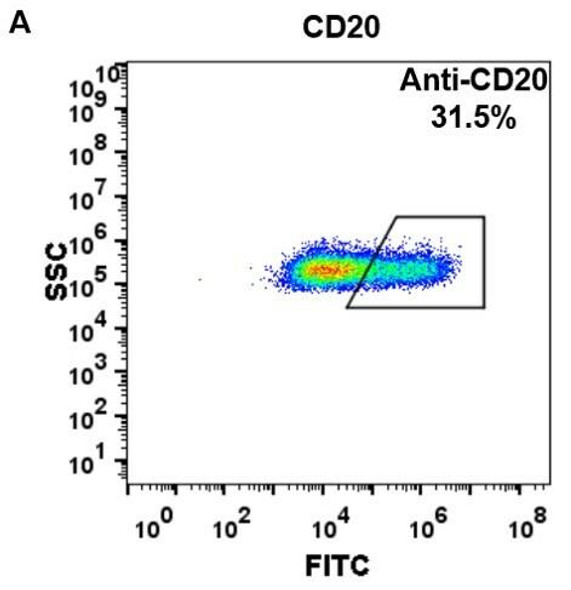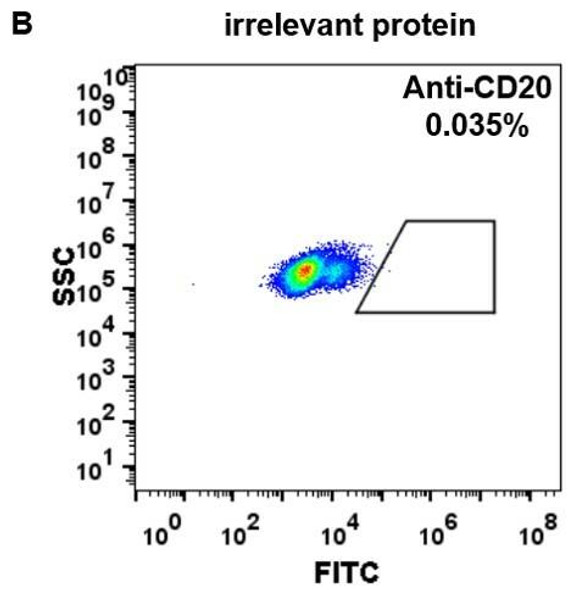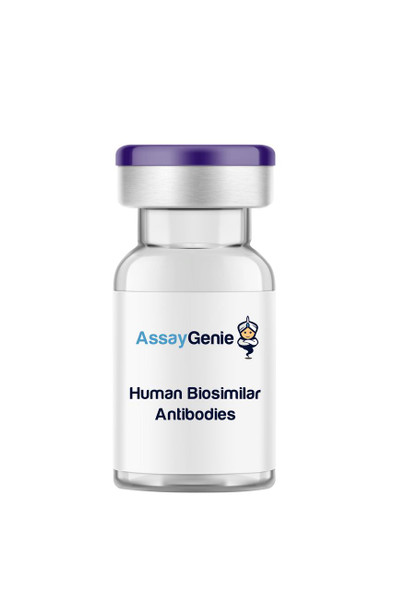VivoGenie Anti-CD20 (Rituximab) Biosimilar (Fc Reduced) (IVMB0243)
- SKU:
- IVMB0243
- Antibody Type:
- In Vivo Biosimilar
- Endotoxin Level:
- Low Endotoxin
- Applications:
- In Vivo
- Disease Area:
- B-Cell Lymphomas
- Disease Area:
- Autoimmune Diseases
- Protein:
- CD20
- Clone:
- 10F381
- Isotype:
- IgG1 kappa
- Reactivity:
- Human
- NHP - Rhesus Monkey
- NHP - Cynomolgus Monkey
- Synonyms:
- B1, S7, Bp35, CVID5, MS4A2, LEU-16, MS4A1, membrane spanning 4-domains A1
Description
system_update_altDatasheet
| Product Name: | Rituximab (Anti-CD20) Biosimilar In Vivo Antibody (Fc Reduced) |
| Product Code: | IVMB0243 |
| Clone: | 10F381 |
| Protein: | CD20 |
| Product Type: | Biosimilar Recombinant Human Monoclonal Antibody |
| Synonyms: | B1, S7, Bp35, CVID5, MS4A2, LEU-16, MS4A1, membrane spanning 4-domains A1 |
| Isotype: | Human IgG1κ |
| Reactivity: | Human/Rhesus Monkey/Cynomolgus Monkey |
| Immunogen: | Human lymphoblastoid cell line SB. |
| Applications: | FC |
| Formulation: | This biosimilar antibody is aseptically packaged and formulated in 0.01 M phosphate buffered saline (150 mM NaCl) PBS pH 7.2 - 7.4 with no carrier protein, potassium, calcium or preservatives added. Due to inherent biochemical properties of antibodies, certain products may be prone to precipitation over time. Precipitation may be removed by aseptic centrifugation and/or filtration. |
| Endotoxin Level: | < 1.0 EU/mg as determined by the LAL method |
| Purity: | ≥95% monomer by analytical SEC |
| Preparation: | Functional grade preclinical antibodies are manufactured in an animal free facility using only In vitro protein free cell culture techniques and are purified by a multi-step process including the use of protein A or G to assure extremely low levels of endotoxins, leachable protein A or aggregates. |
| Storage and Handling: | Functional grade biosimilar antibodies may be stored sterile as received at 2-8°C for up to one month. For longer term storage, aseptically aliquot in working volumes without diluting and store at -80°C. Avoid Repeated Freeze Thaw Cycles. |
| Applications: | FC |
| Recommended Usage: | FC The suggested concentration for Rituximab biosimilar antibody for staining cells in flow cytometry is ≤ 0.25 µg per 106 in a volume of 100 µl. Titration of the reagent is recommended for optimal performance for each application. Each investigator should determine their own optimal working dilution for specific applications. See directions on lot specific datasheets, as information may periodically change. |
| Reactivity: | Human/Rhesus Monkey/Cynomolgus Monkey |
| Specificity: | This non-therapeutic biosimilar antibody uses the same variable region sequence as the therapeutic antibody Rituximab. Clone 10F381 recognizes human CD20. This product is for research use only. |
| Antigen Distribution: | CD20 is primarily found on the surface of immune system B cells. CD20 is highly expressed in the lymph node, and to a lesser extent, the spleen and appendix. |
| Immunogen: | Human lymphoblastoid cell line SB. |
| Concentration: | ≥ 5.0 mg/ml |
| Endotoxin Level: | < 1.0 EU/mg as determined by the LAL method |
| Purity: | ≥95% monomer by analytical SEC |
| Formulation: | This biosimilar antibody is aseptically packaged and formulated in 0.01 M phosphate buffered saline (150 mM NaCl) PBS pH 7.2 - 7.4 with no carrier protein, potassium, calcium or preservatives added. Due to inherent biochemical properties of antibodies, certain products may be prone to precipitation over time. Precipitation may be removed by aseptic centrifugation and/or filtration. |
| Preparation: | Functional grade preclinical antibodies are manufactured in an animal free facility using only In vitro protein free cell culture techniques and are purified by a multi-step process including the use of protein A or G to assure extremely low levels of endotoxins, leachable protein A or aggregates. |
| Storage and Handling: | Functional grade biosimilar antibodies may be stored sterile as received at 2-8°C for up to one month. For longer term storage, aseptically aliquot in working volumes without diluting and store at -80°C. Avoid Repeated Freeze Thaw Cycles. |
| Protein: | CD20 |
| Research Area: | Costimulatory Molecules, Immunology |







